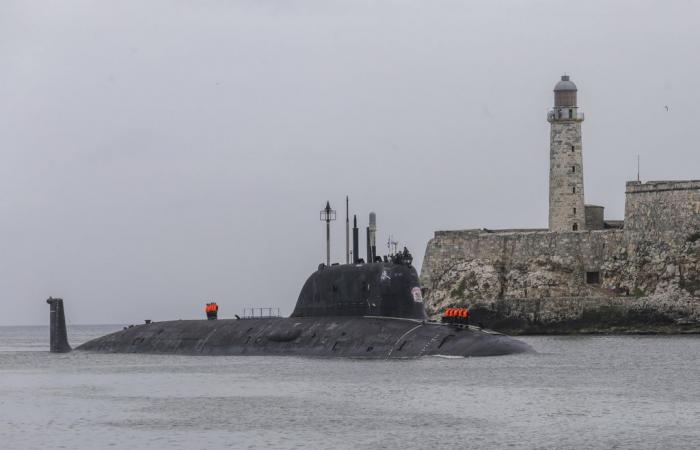
The Russian nuclear-powered submarine that arrived in Havana five days ago left its port this Monday under the watchful eye of not only the Cuban population, but also the international community and, most especially, the United States.
In fact, the US government confirmed again this Monday that it continues to monitor the ships’ journey “closely” although it tried to downplay the importance of the matter, as the Cuban authorities did before by framing it within its “historic relationship” with Russia. and rule out that it posed a threat to the region.
During their stay on the Caribbean island, hundreds of Cubans curiously came to visit the deck of the Russian submarine and frigate.
“Impressive and pleasant afternoon, even in the persistent rain. Welcome, friends of Russia,” the Cuban president published on social networks. Miguel Díaz-Canel, who also visited the ships.
The Russian Navy reported that “after leaving the territorial waters of Cuba, the naval group will continue to carry out missions in accordance with the plan of its journey.”
Although the US suggested two weeks ago that Venezuela could be a next stop, Russian authorities did not specify its destination.
What did the US say about the Russian ships in Cuba?
This Monday, however, the US acknowledged that it had no information on the direction of the fleet. Although he reiterated that he continues to monitor her closely, he tried to downplay the importance of the journey.
“The Russians do this every few years, they take an excursion to Caribbean and Latin American waters,” said White House National Security Council spokesman John Kirby.
“We watch it closely and control it (…), but as we have said before, the interest of this excursion does not pose a threat to the national security of the American people,” he reiterated.
The Pentagon assured that it was “a routine visit to the port,” although many interpreted it as a direct response to Moscow’s movement.
Although Washington did inform Havana of this visit in advance, the Cuban government did not hide its discomfort.
“Evidently, we do not like the presence in our territory and transiting through our waters” a submarine of that nature that belongs to a country with “an official and practical policy that is hostile against Cuba,” said Vice Minister of Foreign Affairs Carlos Fernández de Cossío.
Why did the arrival of the Russian ships to Cuba cause controversy?
The fleet of Russian ships, deployed just 150 km from the coast of Florida, caused controversy since their crossing was detected in the ocean and closely monitored by the United States.
Although Russia had not notified about the naval maneuver – which is usually done to avoid misinterpretations – US officials acknowledged that all countries They have the right to use international waters.
A day later, Cuban authorities confirmed the arrival of the ships and assured that “it corresponds with the historical friendly relations between Cuba and the Russian Federation.”
Furthermore, they stressed that “strictly adheres to international regulations of which Cuba is a State party” and that “none of the ships are carrying nuclear weapons”, so their stopover on the island “It does not represent a threat to the region.”
Shortly before its arrival, Russia confirmed that the flotilla had taken advantage of its journey through international waters to carry out “an exercise on the use of high-precision missile weapons.”
His trip to Cuba took place in the midst of international uncertainty over the future of the Russian invasion of Ukraine and the climate of tension between Russia and the United States, the two nations with the greatest nuclear power in the world.
During the Cold War, the deployment of Soviet nuclear missiles to the island triggered the Cuban Missile Crisis of 1962, when Washington and Moscow came close to going to war.
Does the arrival of Russian ships to Cuba represent a threat to the United States? An expert explains





